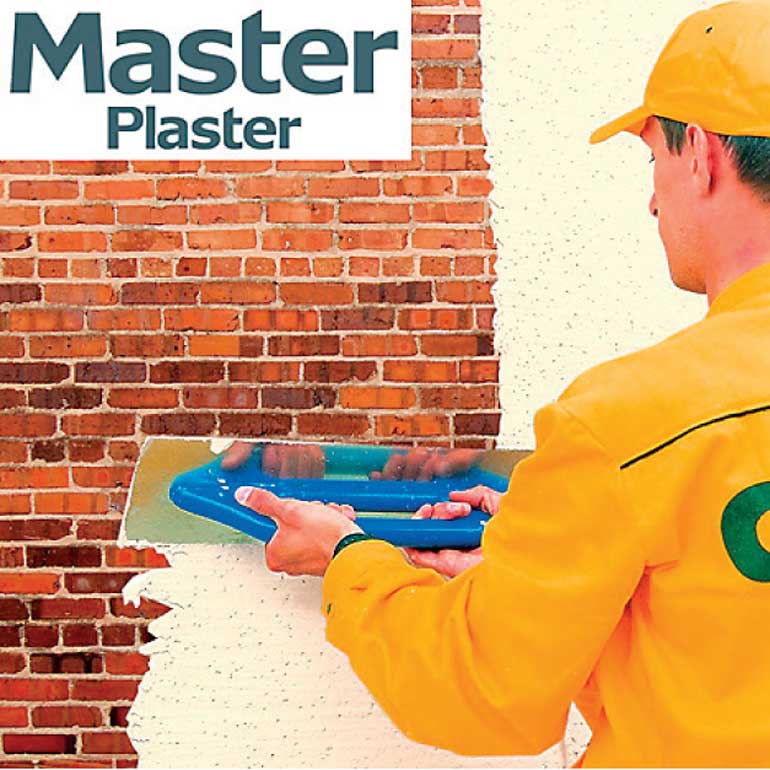Wednesday Feb 18, 2026
Wednesday Feb 18, 2026
Thursday, 10 March 2016 00:00 - - {{hitsCtrl.values.hits}}

JAT Holdings, Sri Lanka’s undisputed leader in the furnishing and finishing industry, recently introduced ‘Master Plaster,’ a product that has revolutionised Sri Lanka’s industrial market.
The conventional manner of constructing wall was to use brick or block and finish it with a coat of plaster which is called plastering. Plastering has traditionally been done through a process of sand-cement plastering finished with POP/putty pruning; a two stage process involving multiple elements namely; sand, cement and water, which is mixed onsite.
However, with a just a single, direct coat application of ‘Master Plaster,’ this outmoded two process method of plastering internal walls has been eliminated, affording optimum, cost effective results.
The unique advantage of ‘Master Plaster’ is that it can easily be applied directly on all internal walls whether it be brick, block or concrete, without the aid of sand-cement plaster and application of wall putty and sanding. With the additional advantage of containing 20 square feet of coverage ensuring a thickness of 12mm in each 25kg bag, it guarantees tremendous value for money.
Moreover its quality that confirms a fineness of 250 mesh and a level of purity of over 96%, makes it the ultimate product in ensuring the best atomic bonding and an absolute mirror finish with perfectly lined and leveled smooth walls. Furthermore, ‘Master Plaster’ can be applied in a single day and even painted within three days. The sand-cement plaster method requires a minimum of eight to 10 days for water curing whereas Master Plaster requires neither curing and nor wastage of water, thus saving both time and money.
The revolutionary cutting edge technology of ‘Master Plaster’ guarantees a staggering 70% saving in both time and cost by incorporating user-friendly innovation. Its ready-mix configuration needs only the addition of calibrated amounts of water, thus enabling the humblest of masons to achieve the most professional of outcomes through a standardized approach compared to the trial-by-error means adopted by traditional methods. The elastic properties of ‘Master Plaster’ certify the complete elimination of hairline cracks which inevitably result from the sand-cement plastering method.
Yet another of the merits ‘Master Plaster’ is its light weight properties when compared to Sand cement, hence reducing the dead load on structures.
In keeping with JAT’s Occupational Health and Safety safeguards, the fire retardant composition of ‘Master Plaster’ makes it non-combustible thereby significantly reducing the risk the loss of lives and property through accidental fire. Furthermore, its low thermal conductivity guarantees energy conservation resulting in lower utility bills.
The sand cement plaster after putty application requires sanding which is a complex and time consuming undertaking. On the other hand, ‘Master Plaster’ allows an easy, dust free application process that is both cost and time effective not to mention a health conscious alternative. It is a lab tested, factory made product which is of superlative quality unlike the attributes of sand used traditionally which is full of impurities and other components which are difficult to monitor and control. Furthermore, in keeping with JAT’s ‘Green Policy,’ ‘Master Plaster’ respects the boundaries set by global environmental protection regulations which frown upon the excavation, transportation and usage of river sand in the building industry.
It is no wonder then that JAT Holdings has grown from strength to strength over the years, and boasts an impressive portfolio of products across a wide range of leading international brands including Sayerlack wood coatings of Italy, Herman Miller office solutions of US, Crown and Permoglaze decorative interior and exterior wall paints of UK, Borma Wachs maintenance range of Italy, Norton Abrasives (Saint Gobain) of France and Brush Master Paint brushes. JAT has successfully expanded its presence internationally across a host of countries such as India, Bangladesh, Maldives and the Seychelles.